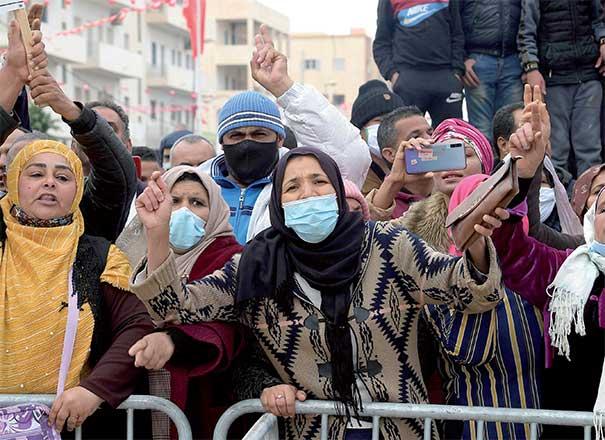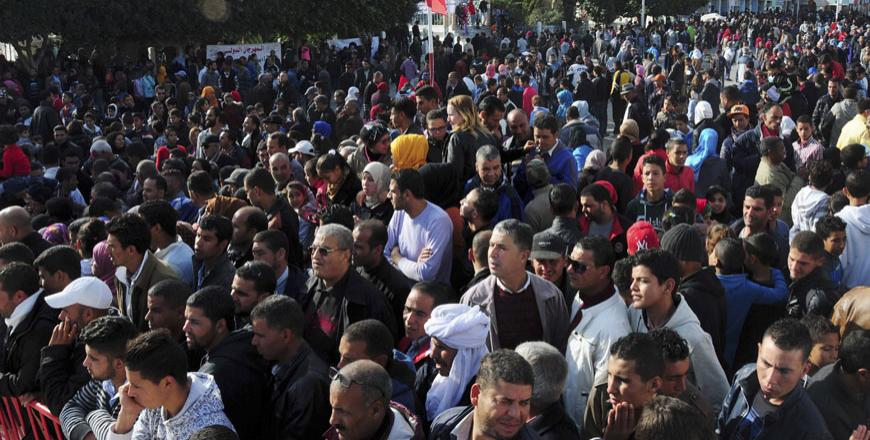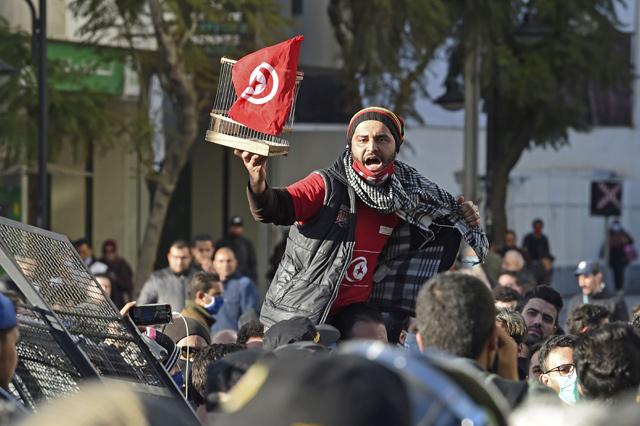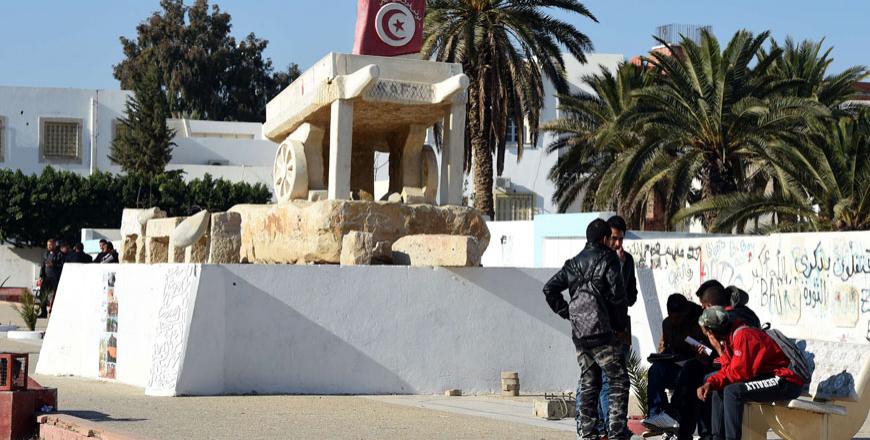You are here
Hopes lie crushed as Tunisians mark a decade since revolution
By AFP - Dec 17,2020 - Last updated at Dec 17,2020

Demonstrators, some mask-clad due to the COVID-19 coronavirus pandemic, chant slogans as they gather in Mohamed Bouazizi Square in the centre of the town of Sidi Bouzid in central Tunisia on Thursday (AFP photo)
SIDI BOUZID, Tunisia — Ten years since the intoxicating birth of Tunisia’s revolution, dreams for a better future lie crushed, and in the rural town where it began, the mood on Thursday was one of anger rather than hope.
It was in Sidi Bouzid that Mohamed Bouazizi, a fruit and vegetable salesman angered by police harassment, set himself alight on December 17, 2010.
His act sparked an unprecedented uprising that toppled long-time dictator Zine Al Abidine Ben Ali, whose flight to exile in Saudi Arabia the next month sparked movements across the Arab world.
The North African country has been praised for its democratic progress since Ben Ali’s ouster.
But Tunisians remain angry at a political class seen as corrupt and unable — or unwilling — to tackle the country’s deep social problems and create much-needed jobs.
“We’ve stopped expecting anything from the political class,” said Sidi Bouzid resident Jamel Bouzidi.
“We’re tired of waiting.”
Rather than festivities celebrating the end of the dictatorship, the anniversary of Bouazizi’s self-immolation sees annual protests against the new regime.
The powerful UGTT trades union said it would not organise any events to mark the anniversary, citing the novel coronavirus health crisis.
Central Tunis remained calm on Thursday, with a heavy police presence.
But in Sidi Bouzid, hundreds of people demonstrated around a sculpture of Bouazizi’s handcart, shouting “work is a right, you bunch of thieves!”
“Every year we see the same angry scenes repeat themselves,” said lawyer Farouk Jaziri.
“People are worse and worse off after 10 years of nothing.”
‘Sense of failure’
Ten years since the uprising, Tunisia’s political class is more fragmented than ever since parliamentary elections last year. It has yet to tackle urgent social and economic problems, which have been exacerbated by the coronavirus pandemic.
Sidi Bouzid resident Abedelhalim Hamdi said runaway inflation made it hard to make ends meet.
“Normal people are fed up,” said the 46-year-old, who has a masters’ degree in history but has been out of full time work for two decades.
He displayed his rough hands, the result of years of casual jobs on building sites or in the fields and orchards around Sidi Bouzid.
Hamdi blamed his situation on “corrupt lobbies... which only allow people to be hired through nepotism, cronyism or private interests”.
International advocacy group Transnational Institute said that while “ostensibly Tunisia is now a democracy”, a string of technocratic governments had failed to improve normal Tunisians’ lives.
“The existing economic trends, and the power of the existing political and economic elites, have in fact been strengthened, and the Tunisian people have yet to reap substantial benefits from their revolution,” it said in a report.
‘Broken promises’
Tunisia suffers unemployment above 15 per cent nationally, disproportionately hitting young people in the long-marginalised interior.
Salaries have been devalued by inflation, while political instability has crushed hopes for fundamental reforms.
The economic situation has pushed many others to make death-defying bids to reach Europe, and Tunisians have been one of the largest contingents of militants fighting in Syria’s civil war.
No official visits to Sidi Bouzid have been announced — even by President Kais Saied, elected in October 2019 on the revolutionary slogan “the people want”.
His office said on Wednesday evening he would not visit the town due to “urgent commitments”.
And by late Thursday afternoon, neither his office nor that of Prime Minister Hichem Mechichi had issued statements marking the anniversary.
In Sidi Bouzid, street vendor Fethi Ziadi said there was “only one explanation” for the absence of political leaders.
“They haven’t kept their promises, so they don’t dare confront us anymore,” he said.
‘Tired of waiting’
Last week, Mechichi was met with cries of “resign!” when he visited the northwestern city of Jendouba to pay his respects to a young doctor who died in an accident in a hospital lift-shaft.
The tragedy was widely blamed on official corruption and indifference.
Strikes, road blockages and protests have mushroomed in recent weeks, with demonstrators demanding more jobs and investment, better work conditions and improvements to crumbling public services.
Tunisia’s parliament remains deeply divided between antagonist party blocs that have struggled to form stable coalitions. Mechichi’s own fragile administration is Tunisia’s ninth since the revolution.
President Saied said in January he wanted to apologise in the name of the state for human rights abuses committed under dictatorships since Tunisia’s independence from France in 1956.
And on Thursday, the official news agency TAP said an account had been opened “to provide reparations to victims of the revolution”.
The uprising and ensuing crackdown left some 300 dead.
Analyst Hamza Meddeb noted the revolution had brought Tunisians some political freedoms.
But, he added, “10 years on from the revolution, there’s a real sense of failure”.
Related Articles
SIDI BOUZID, Tunisia — Tunisia marked five years Thursday since the start of its revolution, with the prime minister vowing no return to "ty
TUNIS — Young Tunisians clashed with security forces overnight and protest organisers called for anti-government rallies Wednesday after fiv
SIDI BOUZID, Tunisia — A giant portrait of the Tunisian street vendor who started a revolution watches over the town where he set hims














